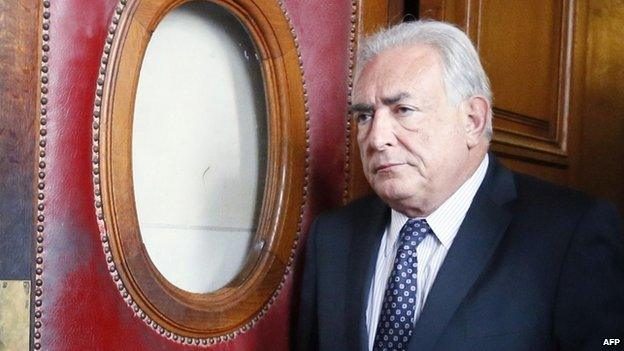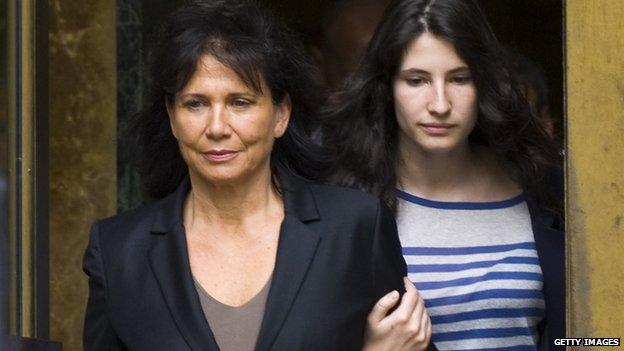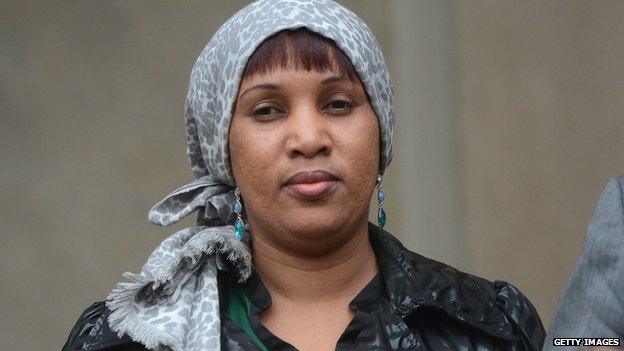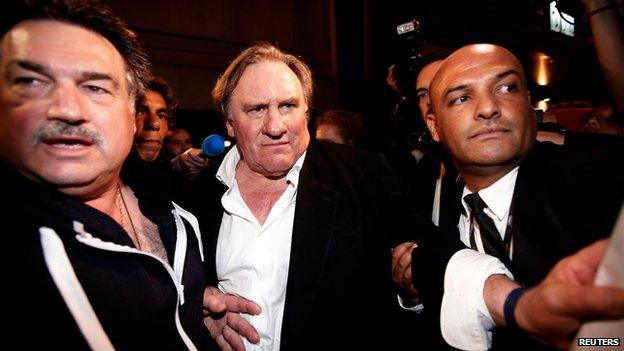Profile: Dominique Strauss-Kahn
- Published

Dominique Strauss-Kahn was once a potential presidential candidate
Revered for his economic acumen, political nous and powers of persuasion, Dominique Strauss-Kahn made a name for himself in the grandest salons of international finance.
By early 2011, his work as head of the International Monetary Fund saw him touted as a potential challenger to Nicolas Sarkozy as president of France.
But in May 2011, his political ambitions were all but ended in a single day when the US authorities filed charges of attempted rape.
He resigned as head of the IMF and, although the criminal charges in the US were eventually dismissed and a civil case against him settled, the scandal ushered in months of accusations and media stories about his private life.
By March 2012 he was facing another serious scandal, when French police launched an investigation over his alleged involvement with a gang suspected of hiring prostitutes.
The case became known as the Carlton Affair, named after the Lille hotel where sex parties took place. Mr Strauss-Kahn acknowledged attending the parties but always denied knowing that some of the women who took part were prostitutes.
He was acquitted of the charge of "aggravated pimping" on 12 June, bringing to an end four years of legal proceedings against him.
'Seduced with words'
Born in 1949 to left-wing Jewish parents, Mr Strauss-Kahn spent his early years in Morocco, leaving with his family after a devastating earthquake in 1960.
He studied law and economics in Paris during and after the famed protests of 1968, eventually becoming an academic known for his diligence and professionalism at the University of Nancy and, later, the University of Paris.

Dominique Strauss-Kahn
Born 25 April 1949 in Paris
Attended France's prestigious Institute for Political Studies (Sciences Po)
Becomes finance minister in 1997
Loses bid for Socialist Party presidential candidacy to Segolene Royal in 2006
Selected IMF head in 2007
Resigns as IMF head in May 2011 to defend charges of attempted rape. Prosecutors drop the charges later that year
Signs undisclosed settlement with hotel maid in December 2012
Goes on trial for aggravated pimping in February 2015

In person, Mr Strauss-Kahn confounded the expectations of those who saw academics as fusty, bookish sorts.
"He seduced with words," one French journalist told the BBC.
He is also known to enjoy a lavish lifestyle.
In 2012 Mr Strauss-Kahn separated from his wife of some 21 years, Anne Sinclair.
The American-French journalist is one of France's richest heiresses, having inherited a fortune from her grandfather, Paul Rosenberg, a leading French art dealer who represented Pablo Picasso and Henri Matisse among others.
The couple were said to have owned properties in Paris, Washington and Marrakesh.

Mr Strauss-Kahn's wife Anne Sinclair and daughter Camille have attended some of his court hearings
In politics, though, Mr Strauss-Kahn seemed prepared to work for his rewards, taking up a seat in France's National Assembly for the town of Sarcelles, just outside Paris.
After a stint as industry minister he was appointed finance minister in Lionel Jospin's Socialist government in 1998, responsible for steering France towards the era of the euro.
Controversy forced him from office by 2000, though, as he faced accusations of corruption and financial scandal. He was eventually cleared of the allegations.
'Deviant behaviour'
He sought national prominence again in 2006 but lost out to Segolene Royal in the battle to become the Socialist Party candidate for president.
When he re-emerged in 2007 at the helm of the IMF, Mr Strauss-Kahn's reputation as a ladies' man was not far behind him - with some people nicknaming him Chaud Lapin (Hot Rabbit).
In 2008, he had an affair with a fellow IMF employee, and was accused of harassment and abuse of power. He was cleared after an internal inquiry.
Those who know Mr Strauss-Kahn suggest that he may have benefited from the traditional French reluctance to probe the private lives of public figures.
In his professional life he continued to win praise at the IMF, with one colleague who recently left the organisation comparing his political skill to that of a "top-level chess player".
"The man is an absolutely brilliant political operator," economist Simon Johnson said in a 2010 BBC Radio 4 profile of Mr Strauss-Kahn.
But his career disintegrated with a series of scandals in 2011 and 2012.

Mr Strauss-Kahn denied Nafissatou Diallo's claims that he tried to rape her in a hotel suite
The allegations of the attempted rape of a maid in New York were swiftly followed by allegations of sexual assault made by French writer Tristane Banon.
US authorities dismissed the criminal case against him amid concerns about hotel maid Nafissatou Diallo's credibility. She pursued the case in the civil courts before settling for an undisclosed sum in December 2012.
The events inspired the film Welcome to New York, with French actor Gerard Depardieu in the lead role. It was released in 2014 and prompted Mr Strauss-Kahn's lawyer to say he would sue US film director Abel Ferrara for defamation.
Meanwhile French authorities took no action against Mr Strauss-Kahn for the writer's sex assault claims because of a statute of limitations.

Gerard Depardieu (centre) invested his own money into the film inspired by the New York sex scandal
In October 2012, French prosecutors ended an investigation into allegations of "gang rape" at a hotel in Washington after the woman who made the claim retracted her evidence.
However, Mr Strauss-Kahn remained embroiled in the Carlton Affair scandal surrounding his alleged involvement in a prostitution ring.
During three weeks of hearings in February, sex workers described his rough behaviour at some of the parties.
But Mr Strauss-Kahn said that he was not on trial for "deviant practices". He told the court he participated in the parties because he needed "recreational sessions" amid one of the world's worst financial crises.
Aside from his time spent in the courthouse, Mr Strauss-Kahn has served as economic adviser to the Serbian government and helped open a bank in South Sudan in recent years.
He launched investment firm LSK & Partners with French-Israeli entrepreneur Thierry Leyne in October 2013. Mr Leyne died in Tel Aviv a year later, having reportedly committed suicide.